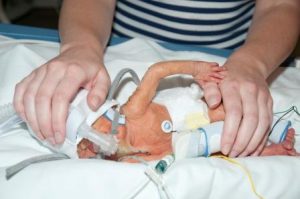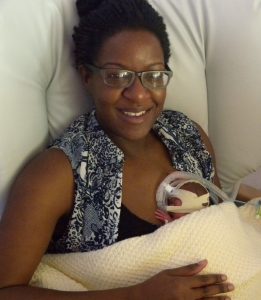Care for your baby is specialised because your baby is so small and young.
Touching and holding
At this age your baby’s skin is sensitive to touch. When you touch one part of your baby’s body you will generally see another part move.
What can you do?
- Prepare your baby for touch by speaking to them in a soft voice.
- Touch your baby slowly, gently and deliberately without making sudden movements.
- When changing your baby’s nappy be calm and gentle, try not to provide a stressful environment for your baby.
- Containment holding – place your hands gently and firmly at your baby’s head and bottom.
- When holding your baby encourage their arms and legs to remain quite central to their body.
- Hold your baby still; avoid rocking as your baby will not tolerate this motion at this age.
- Move your hands away from your baby slowly and gently, with no abrupt movements.
- Kangaroo care and skin to skin – holding your baby will be possible depending on your baby’s condition and development, please speak to the nurse looking after your baby.

Feeding and nutrition
At this age your baby can taste and smell, and you may notice your baby rooting. At this stage your baby will be getting all their nutrition through drips and feeding tubes. If your baby is having milk it will be a very small amount, increasing slowly. You may see your baby starting to suck on their tubes and fingers; at this point it will be useful to introduce a dummy.
What can you do?
- You should be expressing your milk as soon as possible, whether hand expressing or using a pump. Breast milk is important for your baby as it helps build up your baby’s immunity and helps prevent infections.
- Offer a dummy during tube feeds.
- Where possible hold your baby during tube feeds.
- Kangaroo care and skin to skin will help with your milk production.
- Consider placing a breast pad scented with your milk during tube feeds.
- Your baby may suck on their dummy for short periods of time, it’s likely that your baby will need help keeping it in their mouth.

Sleeping
It is often difficult to tell if your baby is asleep or awake at this gestation, however your baby’s sleep pattern becomes more apparent the older they get. Your baby may show brief alert or drowsy states at this age; deep sleep usually increases at around 30 weeks’ gestation.
What can you do?
- When your baby is asleep it is important to try not to wake them. Your baby will use fewer calories when sleeping, which will help with growth and development.
- Avoid light directly into your baby’s eyes and try to keep quiet around your baby’s bed space.
- Before giving care to your baby, wake your baby by gently placing your hands on them.
Positioning
At this age your baby’s movement will sometimes be jerks, your baby’s legs will move more actively. Your baby will try and stretch their arms and legs.
What can you do?
- Your baby should be nursed with boundaries around them to imitate the womb.
- Your baby should maintain a snuggled ‘fetal’ position to facilitate emerging development of extension and flexion of their arms and legs.
- When doing cares and repositioning your baby, this must be done with slow, gentle movements without sudden changes.
Looking, listening and smelling
At this stage your baby’s eyes will open but they will not be able to focus yet. Your baby may begin to start listening to soft sounds yet continues to be sensitive to many sounds. Upon hearing your voice your baby may become quiet and still or may sometimes look at you.
What can you do?
- Avoid loud sounds and voices around your baby.
- Avoid encouraging your baby to look at toys or pictures.
- Use a soft and quiet voice when talking to your baby.
- Think about placing a hankie or muslin cloth in the incubator that has mother’s skin smell on it.
- Protect your baby from strong odours like perfume and aftershave.

 In this section
In this section